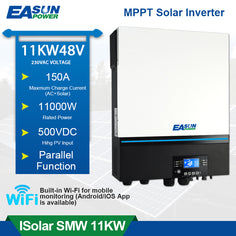Choosing the right solar inverter for your home is a crucial decision that can significantly impact the efficiency and performance of your solar power system. With a wide range of options available in the market, it can be overwhelming to make the right choice. Here are some key factors to consider when selecting a solar inverter for your non-industry home:

Understanding Different Types of Solar Inverters
Before diving into the selection process, it's essential to understand the different types of solar inverters available. The three main types are string inverters, microinverters, and power optimizers. String inverters are the most common and cost-effective option, while microinverters and power optimizers offer individual panel-level optimization.
Assessing Your Energy Needs
One of the first steps in choosing the right solar inverter for your home is to assess your energy needs. Consider the size of your solar panel system, your average energy consumption, and any future expansion plans. This information will help determine the capacity and type of inverter that best suits your requirements.
Considering Efficiency and Performance
Efficiency is a critical factor when selecting a solar inverter. Look for inverters with high efficiency ratings to ensure maximum energy production from your solar panels. Additionally, consider the inverter's performance under different weather conditions and its ability to handle peak loads.
Reliability and Warranty
Reliability is another crucial aspect to consider when choosing a solar inverter for your home. Opt for inverters from reputable manufacturers with a proven track record of reliability. Additionally, check the warranty offered by the manufacturer to ensure long-term protection and peace of mind.
When it comes to selecting the right solar inverter for your non-industry home, thorough research and consideration of your specific needs are key. By understanding the different types of inverters, assessing your energy requirements, prioritizing efficiency and performance, and ensuring reliability and warranty coverage, you can make an informed decision that maximizes the benefits of your solar power system.








